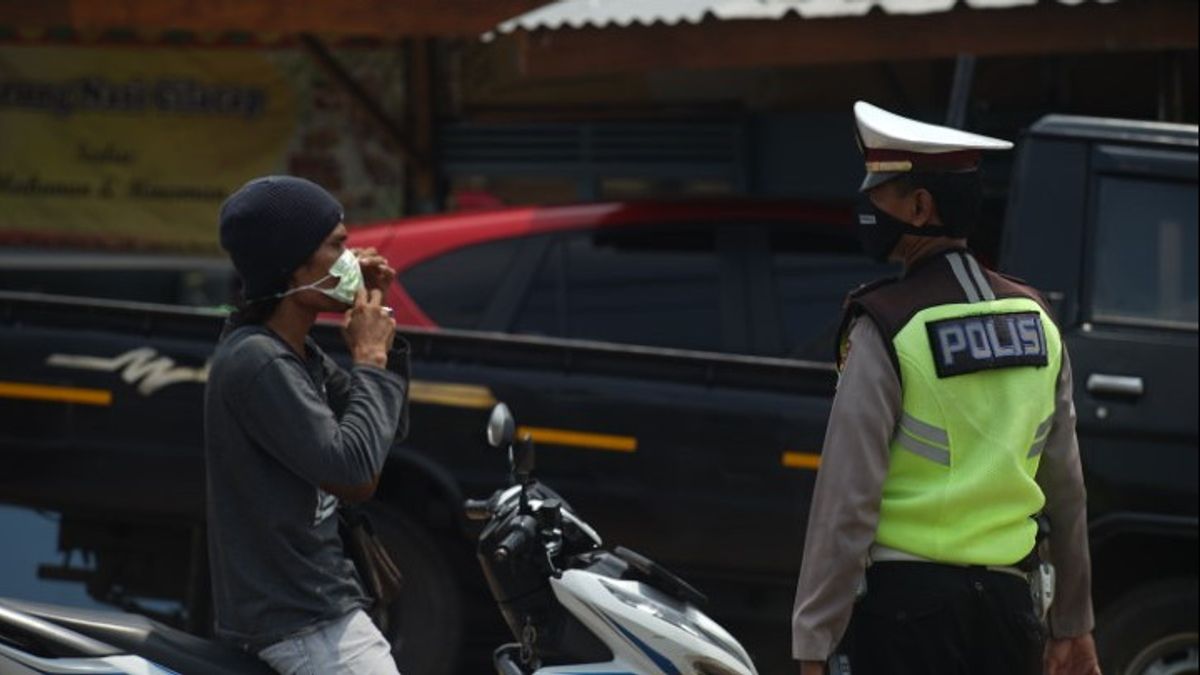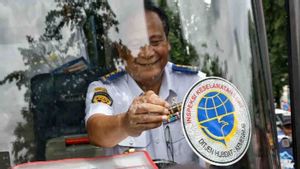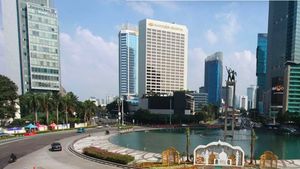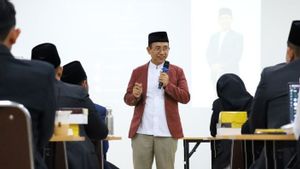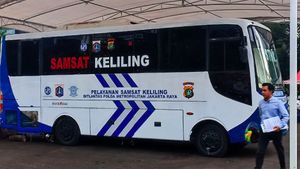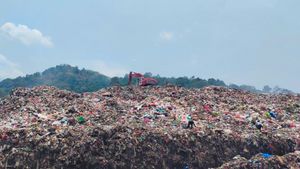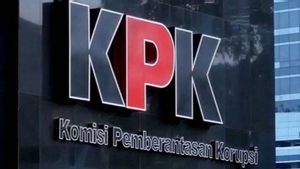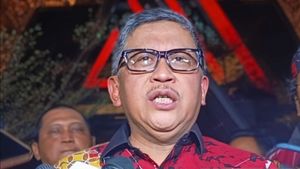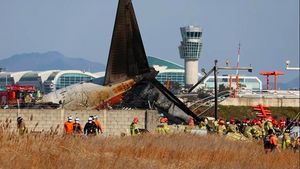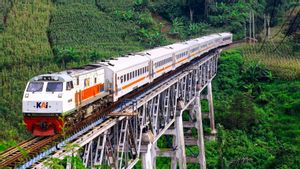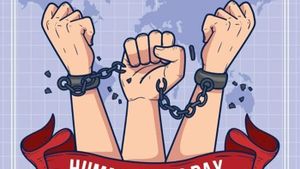JAKARTA - Minister of Home Affairs (Mendagri) Tito Karnavian has issued Minister of Home Affairs Instruction Number 30 of 2021 concerning PPKM Level 4, Level 3, and Level 2 COVID-19 in the Java and Bali Region which is valid until August 16.
In the Minister of Home Affairs, the government stipulates that there are 55 regencies/cities that implement PPKM Level 3 in Banten, West Java, Central Java, and East Java.
In Banten, PPKM Level 3 was implemented in Serang Regency, Lebak Regency, Serang City, and Pandeglang Regency.
In West Java, PPKM Level 3 was implemented in Kuningan Regency, Indramayu Regency, Subang Regency, Garut Regency, Purwakarta Regency, Banjar City, Sukabumi Regency, Pangandaran Regency, Majalengka Regency, Cirebon Regency, Cianjur Regency, Ciamis Regency, Karawang Regency, and the City Tasikmalaya.
In Central Java, PPKM Level 3 was implemented in Purbalingga Regency, Pekalongan Regency, Magelang Regency, Jepara Regency, Cilacap Regency, Brebes Regency, Blora Regency, Pemalang Regency, Grobogan Regency, Tegal Regency, Pati Regency, Temanggung Regency, Kudus Regency, Banjarnegara Regency , Wonogiri Regency, Batang Regency, Rembang Regency, and Pekalongan City.
In East Java, PPKM Level 3 was implemented in Pasuruan Regency, Pamekasan Regency, Pacitan Regency, Kediri Regency, Sumenep Regency, Probolinggo Regency, Tuban Regency, Jember Regency, Bojonegoro Regency, Jombang Regency, Ponorogo Regency, Blitar Regency, Banyuwangi Regency, Situbondo Regency , Ngawi Regency, Bondowoso Regency, Magetan Regency, Probolinggo City, and Pasuruan City.
The PPKM Level 3 rules in Java-Bali are as follows: a. implementation of learning in education units can be done through limited face-to-face learning and/or distance learning based on the Joint Decree of the Minister of Education and Culture, Minister of Religion, Minister of Health and Minister of Home Affairs Number 03/KB/202l, Number 384 YEAR 2021, Number HK. 01.08/MENKES/4242/2021, Number 440-717 YEAR 2021 concerning Guidelines for the Implementation of Learning in the COVID-19 Pandemic Period and for educational units that carry out face-to-face learning is limited to a maximum capacity of 50 percent, except for: 1) SDLB, MILB, SMPLB and SMLB, MALB a maximum of 62 percent to 100 percent by maintaining a minimum distance of 1.5 m and a maximum of 5 students per class 2) PAUD a maximum of 33 percent by maintaining a minimum distance of 1.5 m and a maximum of 5 students per class
b. the implementation of activities in the non-essential sector is applied 100 percent WFH
c. implementation of activities in the sector:1. essentials such as a) finance and banking only covers insurance, banks, pawnshops, futures exchanges, pension funds, and financial institutions (which are oriented to physical services with customers) b) capital markets (which are service oriented with customers and the running of capital market operations well). ) c) information and communication technology includes cellular operators, data centers, internet, postal, media related to the dissemination of information to the public d) non-quarantine handling hotels) export-oriented industries and their supports where the company must show proof of examples of export notification documents (PEB) for the last 12 months or other documents showing export plans and required to have an industrial activity operational and mobility permit (IOMKI), can operate provided that:- for letter a) can operate with a maximum capacity of 50 percent of staff for locations related to services to the community , as well as 25 percent for waiters office administration to support operations- for letter b) to letter d) can operate with a maximum capacity of 50 percent of staff- for letter e) can only operate 1 shift with a maximum capacity of 50 percent of staff only in production facilities/factories, and 10 percent for office administration services to support operations
2) essential in the government sector that provides public services that cannot be delayed, the implementation is imposed by a maximum of 25 percent of WFO staff with strict health protocols
3) critical such as health; security and order; disaster management; energy; logistics, transportation and distribution, especially for the basic needs of the community; food and drink and their supporting equipment, including for livestock/pets; fertilizers and petrochemicals; cement and building materials; national vital object; national strategic projects; construction (public infrastructure), basic utilities (electricity, water and waste management) can operate with the following conditions: - for health and security and order can operate 100 percent staff without any exceptions - for other critical sectors can operate 100 percent maximum staff, only on facilities production/construction/service to the community and for office administration services to support operations, a maximum of 25 percent of WFO staff is applied
d. supermarkets, traditional markets, grocery stores and supermarkets selling daily necessities are limited to operating hours until 20.00 local time with a capacity of 50 percent of visitors
e. for pharmacies and drug stores can be open 24 hours
f. People's markets that sell non-daily necessities can operate with a maximum capacity of 50 percent and operating hours until 15.00 local time
g. street vendors, grocery stores, voucher agents/outlets, barbershops/barbershops, laundry, hawkers, small workshops, vehicle washes, and others are allowed to open with strict health protocols until 20.00 local time and technical arrangements are made by local government
h. implementation of eating/drinking activities in public places: 1) food stalls/warteg, street vendors, hawker stalls, and the like are allowed to open with strict health protocols until 20.00 local time with a maximum of 3 visitors eating in place and a maximum meal time of 30 min.2) restaurants/restaurants, cafes located in closed buildings/stores, both in separate locations and in shopping centers/malls, only accept delivery/take away and do not accept dine-in. 3) restaurants/restaurants, cafes with service areas in open spaces are permitted to open with strict health protocols until 20.00 local time with a maximum capacity of 25 percent, one table for a maximum of two people, and a maximum meal time of 30 minutes whose technical arrangements are determined by local government.
i. activities at shopping centers/malls/trade centers can be opened with the following conditions: 1) activities at trade centers are allowed to operate 25 percent from 10.00 WIB to 20.00 WIB with health protocols regulated by the Ministry of Trade 2) population under 12 years of age and above 70 years old prohibited from entering shopping centers/malls/trade centers3) cinemas, children's playgrounds, and entertainment venues in shopping centers/malls/trade centers are closed
j. implementation of construction activities for public infrastructure (construction sites and project sites) operates 100 percent and small-scale construction is allowed a maximum of 10 people by implementing stricter health protocols
k. places of worship (mosques, prayer rooms, churches, temples, monasteries, and pagodas as well as other places that function as places of worship), with a maximum of 25 percent capacity or 20 people taking into account the technical arrangements from the Ministry of Religion
l. public facilities (public areas, public parks, public tourist attractions and other public areas) are temporarily closed
m. arts, culture, sports and social activities (locations of arts, culture, sports facilities and social activities that can cause crowds and crowds) are temporarily closed
n. public transportation (public vehicles, mass transportation, taxis (conventional and online) and rental/rental vehicles) is enforced with a maximum capacity setting of 70 percent by implementing stricter health protocols
o. the implementation of the wedding reception can be held with a maximum of 20 invitations and not holding meals on the spot by implementing more stringent health protocols
p. domestic travelers who use private cars, motorbikes and long-distance public transportation (airplanes, buses, ships and trains) must: 1) show a vaccine card (at least the first dose of vaccination) 2) show H-2 PCR for aircraft and Antigen (H-1) for modes of transportation of private cars, motorbikes, buses, trains and ships 3) the provisions as referred to in number 1) and number 2) only apply to arrivals from outside Java-Bali or departures from Java and Bali to outside Java and Bali, and does not apply to transportation within the agglomeration area for example for the Jabodetabek area4) for travel by airplane between cities or districts within Java-Bali can show a negative result of Antigen (H-1) provided that the second dose of vaccination has been obtained, and a negative result of H-2 PCR if you have just received a dose of 15 vaccine) for drivers of logistics vehicles and other goods transportation are excluded from the provision of having a v card axin
q. keep wearing masks correctly and consistently when carrying out activities outside the home and not allowed to use face shields without wearing a mask
r. The implementation of PPKM at the RT/RW, village/kelurahan and sub-district levels is still enforced by activating posts at each level by looking at the zoning criteria for regional control.
The English, Chinese, Japanese, Arabic, and French versions are automatically generated by the AI. So there may still be inaccuracies in translating, please always see Indonesian as our main language. (system supported by DigitalSiber.id)
